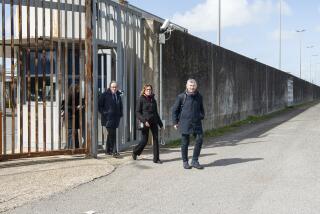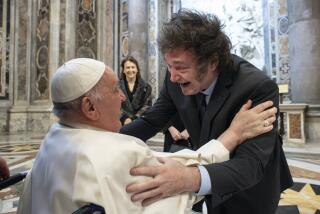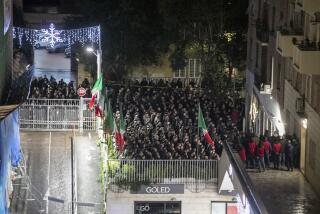Italy’s Mario Monti speaks softly and carries a big question mark
ROME — Quiet and bookish, a little colorless, Mario Monti doesn’t seem the kind of man to inspire religious epiphanies. But his leadership of Italy in the last five months has moved one leading politician to declare it not just a “miracle,” but proof that God exists.
Granted, his transformation from mild-mannered technocrat to the man charged with saving Italy has been a bit startling. From a photo op with President Obama in the White House to a whistle-stop tour of Asia to woo foreign investors, Monti is on a tear, busy telling the world that his country is back in business.
Here at home, he’s trying to revitalize the sluggish Italian economy and lighten a crushing load of government debt. As prime minister, Monti is determined to push controversial labor reforms through Parliament and persuade global financial markets to keep Italy afloat, not sink it.
It’s an exhausting, herculean task for this unflappable leader of 60 million people, none of whom actually voted for him.
Since mid-November, Monti and a group of similarly unelected ministers have presided over an emergency government appointed with the sole mission of pulling the country out of its financial and economic morass. The suspension of normal democratic processes is supposed to be temporary, lasting only till elections next year.
Despite the lack of an electoral mandate, Monti’s administration has been hailed at home and abroad for its can-do attitude after years of Italian official inertia.
To Pier Ferdinando Casini, it’s nothing short of an answer to a prayer.
“Only a grand coalition is able to make the kind of unpopular decisions needed to save the country, even more so if this coalition is presided over by a man like Monti, who’s a technocrat and not a politician,” said Casini, head of the Terzo Polo (Third Pole) party.
“Up until a year ago, this was a dream. We talked about it, and everybody else would either laugh it off or push us away with scorn,” Casini said in an interview in his Parliament office. “The miracle happened. I’m Catholic, and this means God exists.”
But choppy water lies ahead as some of the new government’s more unpopular policies start to bite. The proposed labor reforms, which would make it easier for employers to fire workers, are already putting a dent in Monti’s approval rating and sparking the threat of strikes.
And the experiment in government by nonelected technocrats has scrambled Italy’s political system such that no one, not even seasoned analysts, dares predict what lies on the other side.
Will the current parties, reviled by many Italians, continue to exist? Or will Monti, a Yale-educated economist, find his unlikely premiership extended, as one prominent politician is suggesting, to the potential detriment of democracy in the land that produced Mussolini?
“There’s been a dismantling of old patterns,” said Roberto D’Alimonte, an expert at LUISS Guido Carli university in Rome. “We are dancing in the dark.”
Still, world leaders have embraced the serious-minded Monti as a welcome relief from his predecessor, Silvio Berlusconi, whose sex scandals and clownish personality had turned him and Italy into something of a laughingstock. The markets have rewarded Monti’s agenda of austerity cuts and structural reforms by lowering Rome’s borrowing costs, which hit intolerable levels in the autumn and precipitated Berlusconi’s downfall.
Italians are proud that their country once again commands respect in the corridors of power, especially within the European Union. Monti, 69, has rejoined the leaders of Germany and France in the top tier of EU decision-makers, bringing a counterbalancing southern European perspective to the Berlin-led effort to tame the region’s debt crisis.
“With Monti, we see that Italy is mattering again, and so people are happy about that,” said Massimo Franco, a political columnist for the Corriere della Sera newspaper. “Europe wanted badly again to have Italy come into the game.”
Monti is already a well-respected figure in Brussels, where he served for many years as the European Union’s commissioner in charge of bolstering the single European market. As competition commissioner, he did battle with Microsoft, which was slapped with a then-record EU fine of more than half a billion dollars in 2004 for breaching antitrust rules.
A year later, Monti was back in Italy, serving as president of his alma mater, Bocconi University in Milan, and settling into the peaceful academic routine he finds more to his liking.
“I’m not very sociable. You can imagine all the dinner speeches I’ve had to give all these years around the world. Every time it’s a struggle,” he told an Italian newspaper at the time.
But hopes for a comfortable, low-key life — he and his wife, Elsa, enjoy nights out at La Scala, the world-famous opera house — were dashed when Italian President Giorgio Napolitano asked him to form an emergency government.
Within weeks of taking office, Monti launched his Grow Italy campaign to unblock the sclerotic economy and make it more competitive. In spite of high living standards and world-class brands such as Fiat and Prada, economic growth in Italy has been abysmal; only a few countries, such as Zimbabwe and Haiti, recorded a worse rate of growth in the first decade of this century.
Italy is also staggering under the biggest government debt load of any developed nation: about $2.5 trillion, or 120% of gross domestic product.
To pare that back, Monti succeeded in getting Parliament to pass a $40-billion austerity package. He raised taxes, boosted the retirement age, went after suspected tax cheats and made other changes that previous governments promised but never carried out.
Parliament’s quarrelsome factions have mostly submitted meekly to Monti’s proposals, fearing a public backlash if they don’t. They know that trust in the political establishment is at a historical low: In a recent poll, a barely detectable 2% of respondents said they had strong faith in Italy’s traditional parties.
That means that even the recent drop in Monti’s approval rating because of the proposed labor reforms — it recently dipped below 50% — still puts him leagues ahead of any of Italy’s usual political actors.
Casini is calling for Monti to stay on past the 2013 elections, arguing that Italy’s economic crisis will take more than just a year to solve. But critics warn that such a move could send the country down the wrong path, even if it’s far from the dictatorial Fascism of Mussolini nearly a century ago.
Monti himself has been coy about his intentions, although he apparently foresees a return to some version of normality after next year’s election.
“The ‘political’ governments will be back, as is natural,” he wrote in a letter published last month in Corriere della Sera, saying there was “no such thing as ‘Montism.’ ”
Many here are touting him as Italy’s next president, a ceremonial post that wields great moral authority and that would give him a bully pulpit from which to prevent politicians from trying to undo his work as prime minister.
But the political landscape has already been thrown into confusion by this interruption of regular democratic practice, leaving a potential vacuum once Monti departs.
“Nobody knows exactly what political Italy will be in one year’s time,” said Franco, the columnist. “I’m sure that the political geography one year on will be completely different.”
More to Read
Start your day right
Sign up for Essential California for news, features and recommendations from the L.A. Times and beyond in your inbox six days a week.
You may occasionally receive promotional content from the Los Angeles Times.







